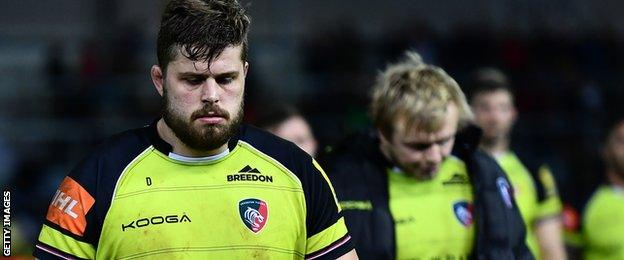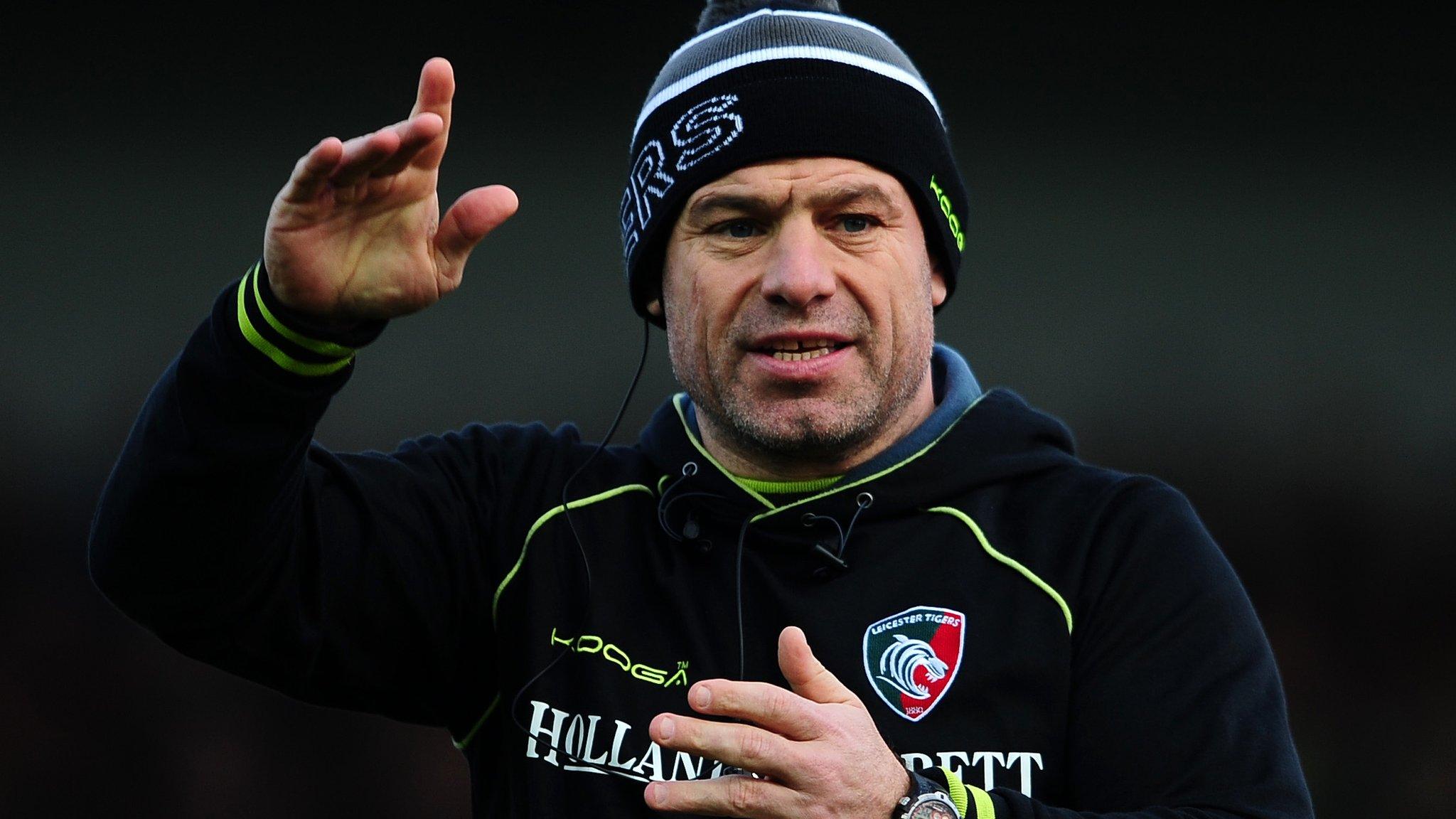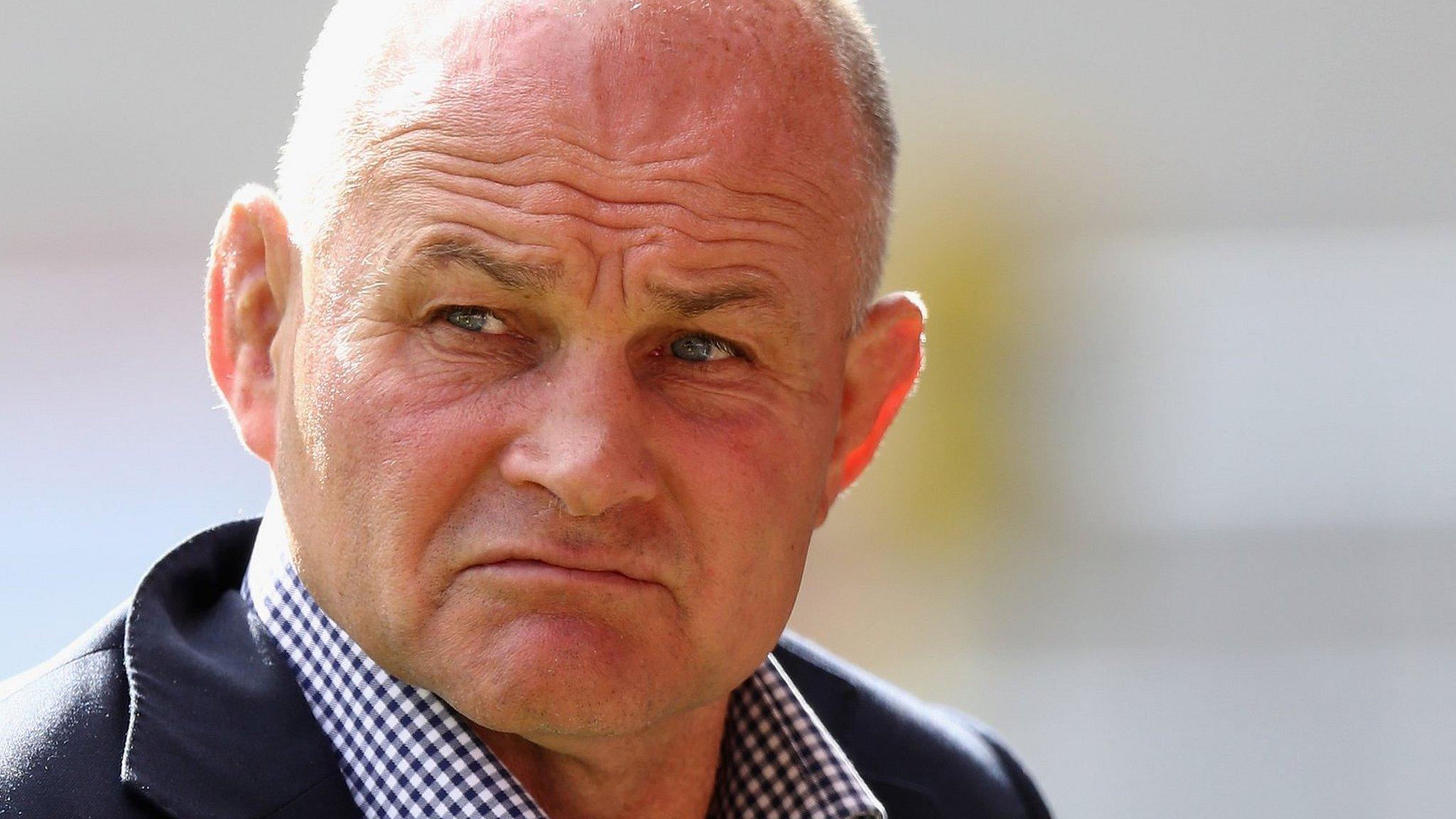Premiership bosses more vulnerable to sackings, says Rugby Coaches Association
- Published

Mike Ford, Richard Cockerill and Andy Robinson (left to right) have all left their posts with Bath, Leicester and Bristol in the past year
The recent spike in Premiership sackings shows a "worrying trend", says the Rugby Coaches Association (RCA).
Exeter Chiefs boss Rob Baxter also says a "sacking culture" comparable to football is creeping into rugby union.
Leicester director of rugby Richard Cockerill became the third boss sacked in eight months on Monday, while five left in five years before 2016.
"It appears that coaches are a lot more vulnerable than they had been," said RCA founder and director Richard Moon.
Moon, a former Harlequins scrum-half and Rugby Football Union committee member who established the forerunner to the Rugby Players' Association, said one of the main reasons for setting up the RCA in 2012 was to prevent a "football-like" situation from developing.
But, when asked whether rugby union was heading towards a hire-and-fire approach, Baxter told BBC Spotlight: "The facts state that it is."
The 45-year-old, who has been in charge of the club since 2009 when they were in the second tier, said job security for directors of rugby and coaches will "unfortunately be driven by the professional game, the need to stay in the Premiership or be successful in the Premiership".
'A worrying trend'

Cockerill was fired after eight years in charge of Leicester
Cockerill was the second director of rugby sacked this season after Andy Robinson at Bristol, with Mike Ford leaving Bath as head coach last term - just 12 months after being named Premiership coach of the year and having only recently been linked with the England job.
Moon said the timing of recent departures was more damning than the increase in sackings themselves.
"There have been more - but ever more interestingly it's when they are happening," said Moon. "They are tending, more recently, to happen during a season rather than at the end of a season.
"As an association we are keeping an eye on these developments. More and more, if coaches are not given a reasonable and realistic chance to get to where they want to be in a season, short-termism is of real concern."
Cockerill was sacked 12 games into the campaign with Leicester fifth in the table, just five points adrift of Bath in fourth spot, and having led Tigers to semi-finals in both the Premiership and European Champions Cup only last season.
In his eight years in charge, Leicester never failed to reach the Premiership play-offs - winning three titles and finishing runners-up twice.
Robinson, the former England and Scotland head coach, was sacked by Bristol 10 games into the Premiership season, after guiding them back to the top flight following a seven-year absence last May.
"There is more short-termism because rugby is big business now," added Moon.
"There is more expectation on rugby coaches, certainly in the Premiership, to deliver - and if they are not delivering in a short time frame it would seem that owners are being more proactive than they have been in the past.
"Coaches seem to be judged on short-term goals and results. Are they judged a bit like football managers in their first two or three games? Or do you get to Christmas, Easter or the Premiership play-offs? That time period is getting smaller and smaller."
'Feeling the pressure'

Ed Slater says Leicester's players need to take "more ownership" of performances after Cockerill's sacking
Sale director of rugby Steve Diamond admits his job is under scrutiny at the AJ Bell Stadium - with Sharks on an eight-match losing run - but he denies the turnover of coaches can be compared to football.
"Are we under pressure? Definitely, we need to get some results," Diamond told BBC Radio Manchester.
"But we know what we are doing and there is no-one better to get us out of the hole we are in than me."
When asked if he thought recent sackings were reactionary, Diamond said: "No, not really. Each club is run differently and every club has different pressures."
Tigers, English rugby's most successful club with 10 domestic titles, last won silverware in 2013, beating Northampton Saints in the last of nine straight Premiership final appearances.
Leicester lock Ed Slater said the recent spate of sackings were "what you guys want to write about" when questioned by BBC Radio Leicester on the subject.
"Cockers had been here for a long time," he said. "We haven't been to a Premiership final for three years now and at a club like Leicester we are aware of expectations and he ultimately paid the price - we know we want to win silverware and are expected to win silverware.
"Four years without something is a long spell."
'Cascade of sackings'

England and Leicester centre Manu Tuilagi suffered a costly season-ending knee injury in Cockerill's final match in charge
Exeter boss Baxter said the growing popularity of Premiership rugby and increased riches in the game is where the pressure comes from.
"The demands of crowds and rugby clubs and the money that is starting to come into the game through TV, a lot of these things are very positive - we work very hard to build our supporter base and a product that people want to buy.
"Unfortunately, one of the repercussions of that is that people become more demanding. Sometimes, rightly or wrongly, in pursuit of success - or what is deemed to be success - someone pays the price.
"The fact the Premiership is so competitive is something people should cherish and not be too afraid of. That is the balance you would like to think most clubs would come to.
"You understand that a season will tilt with one or two injuries or one or two results. Having the strength to see that through is hopefully what we will get back to in rugby and we won't see a cascade of sackings.
"Some sackings and some changes of management happen for reasons outside of rugby results and those always happen - but when purely based on results people need a little more understanding."
'Learning from the LMA'
Moon says he spoke to Richard Bevan, chief executive of football's League Managers' Association (LMA), when forming the RCA and believes rugby coaches face some harsher realities than their football counterparts.
"Unlike football, there is not enough professional or semi-professional clubs out there to realistically believe that if you lose your job you will walk into another one at the same level immediately. It is very rare," said Moon.
"It is important that coaches get the right level of support and backing that their day job deserves.
"Richard was incredibly helpful when we identified this idea. They are a juggernaut of an organisation that have been going for a long time and they do invaluable work.
"We are some way behind that in the rugby world."
Analysis
Chris Jones, BBC Radio 5 live rugby union reporter
"It is not necessarily a case that suddenly rugby union has adopted a different culture compared to before, but perhaps there are changes as a result of the competitiveness of the Premiership - influenced by the greater central revenues from Rugby Football Union and TV money - coupled with the new private investment at some clubs.
"There are probably seven or eight clubs who truly feel they should occupy the top four - or be even better off - in the Premiership.
"These clubs include Saracens, Wasps, Exeter, Bath, Leicester, Northampton, Harlequins, Gloucester, while Sale are a club that firmly considers themselves to be a top-six side. In saying that, Bristol, Worcester and Newcastle are all highly ambitious as well.
"Wasps and Sale have been boosted by fairly recent private investment, while Gloucester are on the verge of a takeover. Bristol have a billionaire owner too. These are people who all want success, while the traditional powerhouses such as Leicester, Northampton and Harlequins also demand results.
"No club is content with its status quo - maybe apart from European and Premiership champions Saracens - and with high expectations from fans and in the boardrooms, comes pressure on coaches - and sackings."
- Published2 January 2017

- Published7 November 2016

- Published16 May 2016
